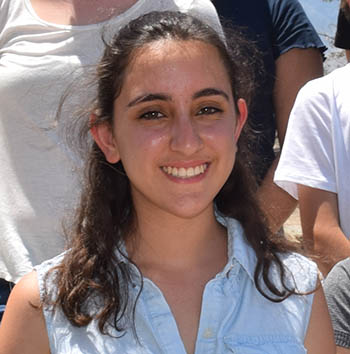
Gaelle Elalam
Gaelle Elalam’s professional interests don’t necessarily intersect with her work at USC Shoah Foundation, but that work is just as impactful.
The wannabe engineer has been a Junior Intern for the Institute since 2015, spending one day out of the month engrossed in analyzing what attitudes breed hatred and intolerance, how you can spread positive moral authority and how you can become an active participant in civil society.
Elalam, a Lebanese-born high school junior in West Los Angeles, first was drawn to the Junior Intern program for the analytical thinking she and other interns would be asked to do, in answering questions about what connects people as human beings, and what causes the disconnect that leads to violence and genocide.
“At meeting, we aim to answer the essential questions,” Elalam said. “What connects and disconnects us as human beings? How does hate happen? How can you counter it, and intolerance? How do you choose to become a bystander, or to become an active participant, in civil society? How can we affect the world around us? We usually focus on one or two every session, and we look at different testimonies to help us come up with a conclusion that aims to answer the question.”
The program, designed by the education department of USC Shoah Foundation, works to provide the Junior Interns with all the tools they need to answer those questions, from access to the Visual History Archive and IWitness activities to discussion with Institute fellows and staff.
Elalam has found value in studying the different genocides of history through the lens of survivors in the testimony – one of the objectives of the program.
“At school, we barely cover the Rwandan genocide, the Armenian genocide and the Holocaust,” Elalam said. “But as a Junior Intern, I had to look in-depth at these events. I’ve learned about how propaganda played large role in the implementation and execution of the Rwandan genocide, learned how important empathy is and how it can be used to connect us as human beings and eliminate hate.”
All of the local Junior Interns, all between seventh and twelfth grade, have had the opportunity to visit, either physically or virtually, museums and authentic sites, and to contribute to the work of the Institute through their own research and interaction with IWitness and with one another.
In the coming months, they’ll also craft and deliver presentations on what they’ve learned, continue to interact with Institute staff and have ample opportunity to make social impact and work with people of diverse backgrounds and cultures with the interpersonal communication skills they’ve been taught throughout the program.
“The program has taught me essential communication skills that I will definitely use in the future – we discuss heavy topics with maturity,” Elalam said. “And the testimonies have taught me to be more empathetic and to put myself into other people’s shoes. Testimonies have changed how I look at these horrendous events. Before, they were just stories in my history textbook; but testimonies have humanized these events.”